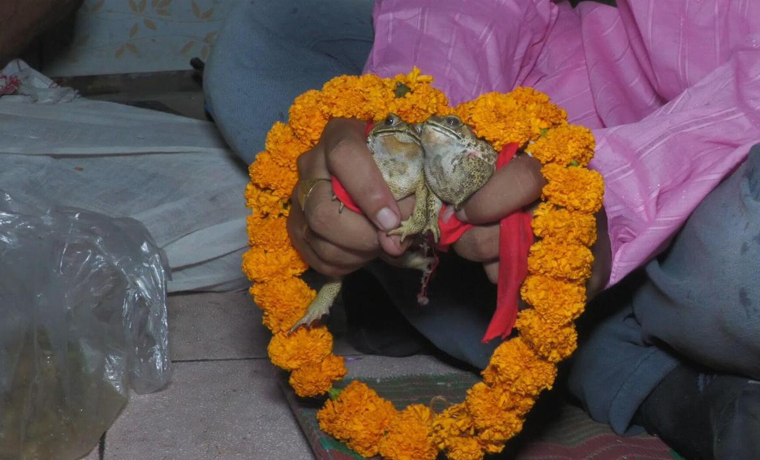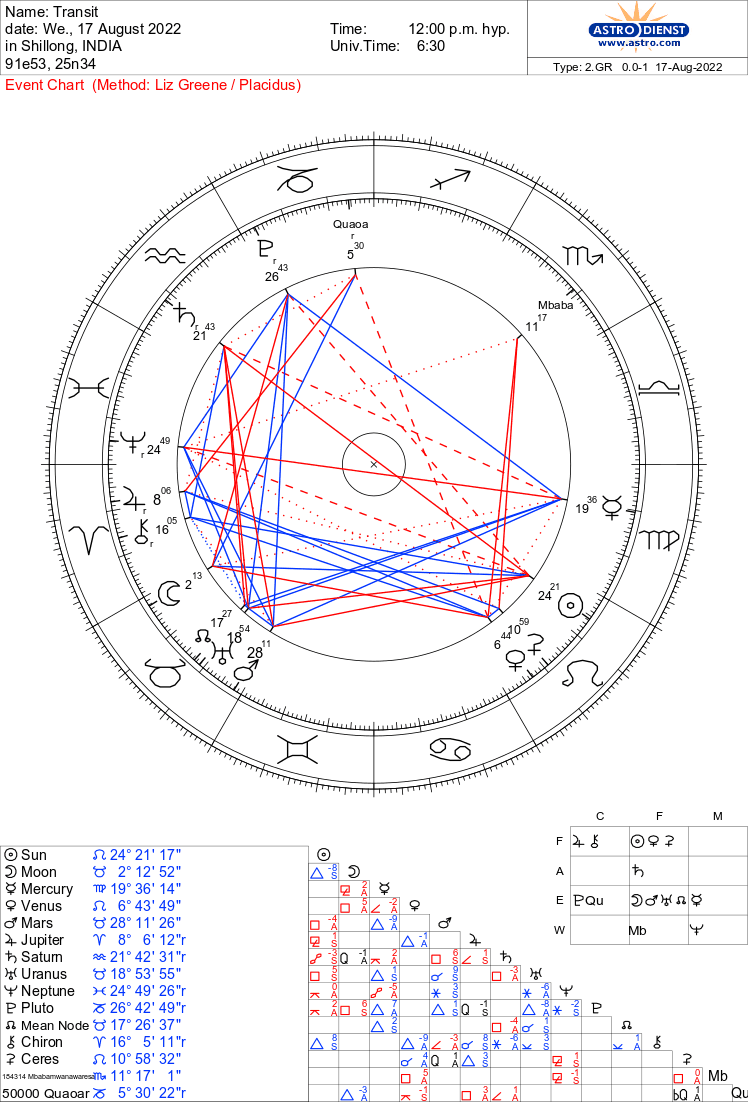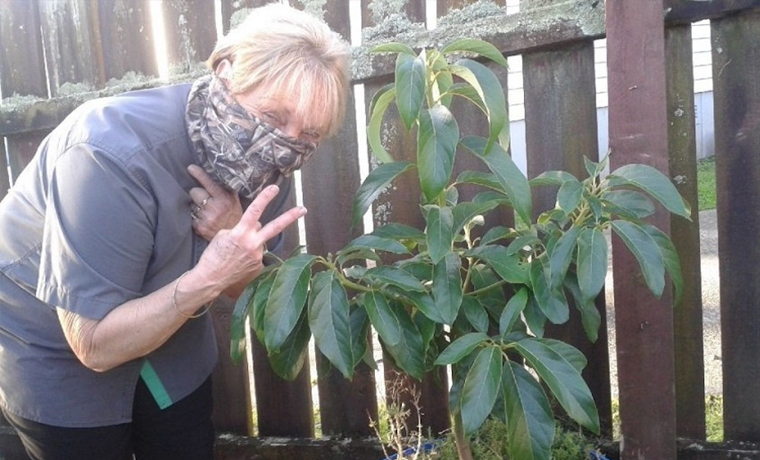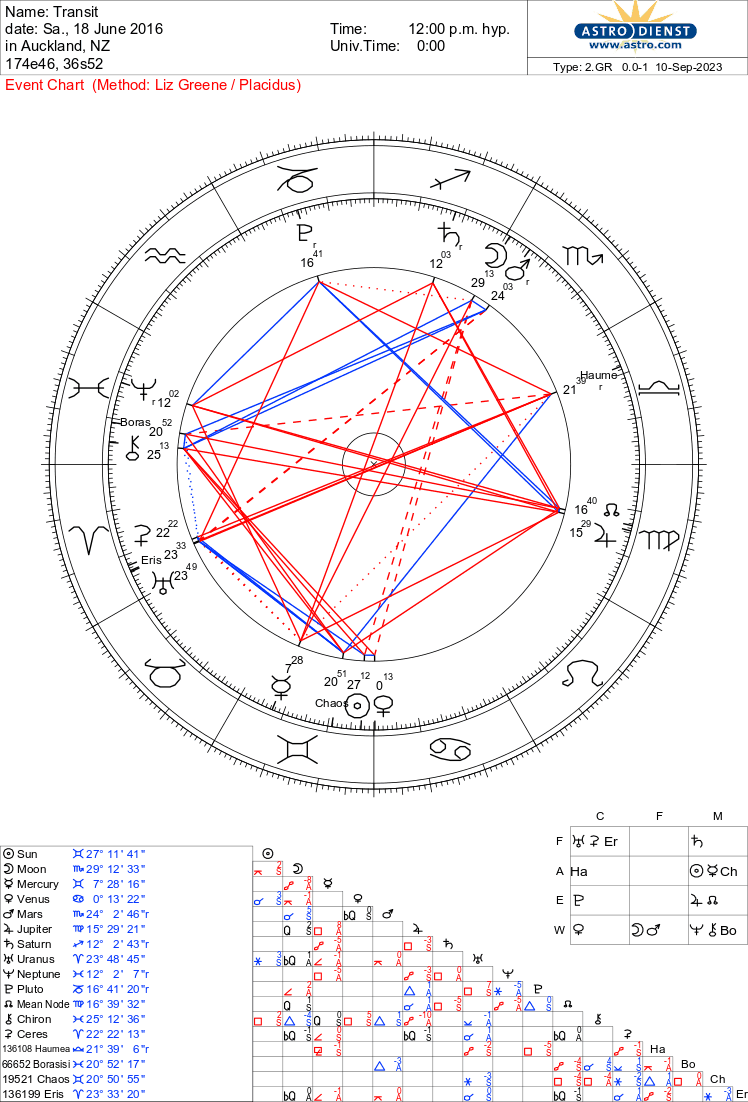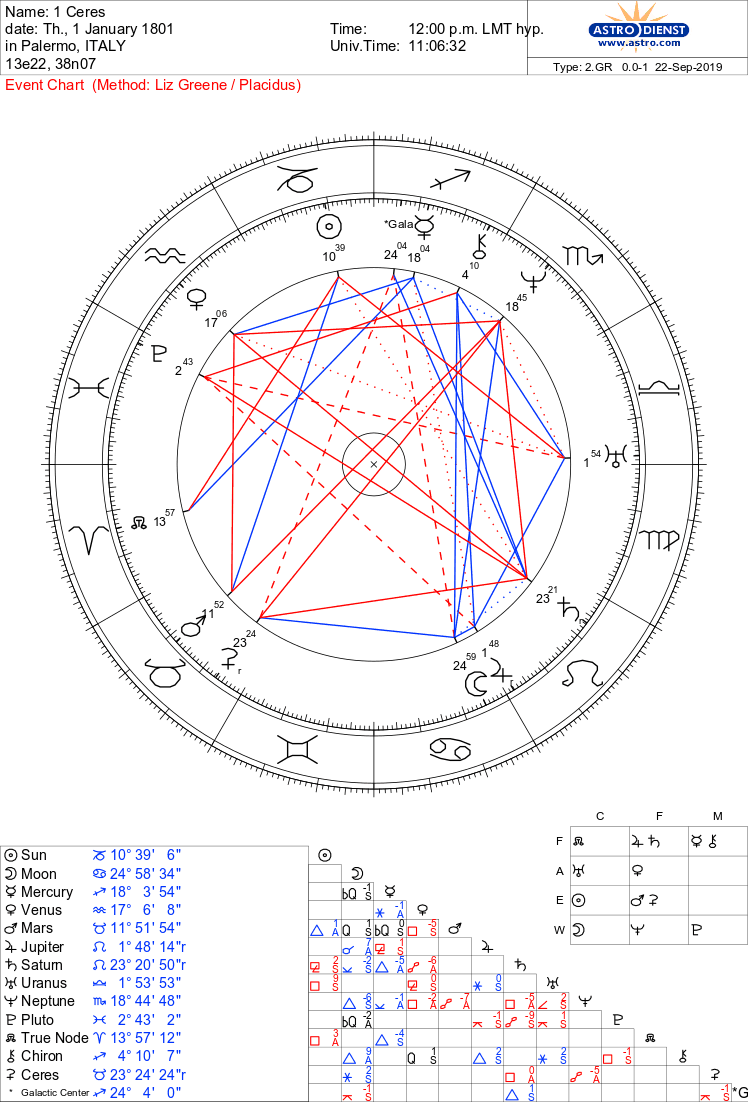Ceres
1 Ceres is a dwarf planet in the middle main asteroid belt between the orbits of Mars and Jupiter. It was the first known asteroid, discovered on 1 January 1801 by Giuseppe Piazzi at Palermo Astronomical Observatory in Sicily, and announced as a new planet. Ceres was later classified as an asteroid and then a dwarf planet, the only one inside Neptune's orbit. Piazzi's proposed name for his discovery was Ceres after the Roman goddess of agriculture.
Frog, marry, rain! Indian villagers hold bizarre wedding ceremony to appease the weather god.
A group of villagers held an unusual Hindu wedding ceremony for two frogs in Assam on Saturday; a ritual intended to get the attention of their deity, Lord Indra, and bring rain after weeks of intense heat.
Ceres (gardening, growing) opposition Haumea ("Spin" as in political or media framing of events (if we permitted personal gardens we might not have an avocado shortage causing a crime wave)). Chaos (worked up, paranoid, projecting fears) square Borasisi (distortion of data (the only thing holding us back is the ill-informed anti-gardening lobby, but if overseas trends are anything to go by, their days are numbered)).
Ceres (relationship with nature) square Mbaba Mwana Waresa (rain, sky, clouds, weather, seasons, raindances, ceremonies for the good of the Earth, weddings) bi-quintile Quaoar (birds, frogs, bears).
"To appease the rain god we are conducting this marriage. Farmers are facing a lot of problems due to a lack of rain, so we have arranged this wedding," said organiser Deepak Das.
Scores of guests attended the event in the village of Guwahati. The priest covered the frogs in red paint, cloth and a garland, as the congregation chanted prayers before they were officially married.
New Zealand's absurd gardening ban once again makes us the laughing stock of the Internet. An anonymous Kiwi mum shows off her illegal avocado tree. Credit Dina Batman
The internet rediscovered New Zealand's longstanding ban on personal gardens, and it collectively lost its mind. Joshua Drummond argues that the ban has had its day.
Mercury (writing, mental, expressive) opposite Saturn (serious, realistic thinking, reality check) square Neptune (the use of imagination). Ceres (gardening, growing) opposition Haumea ("Spin" as in political or media framing of events (if we permitted personal gardens we might not have an avocado shortage causing a crime wave)). Chaos (worked up, paranoid, projecting fears) square Borasisi (distortion of data (the only thing holding us back is the ill-informed anti-gardening lobby, but if overseas trends are anything to go by, their days are numbered)).
Well, it happened again. We should be used to it by now. It's only a year since the topic of New Zealand's gardening ban last exploded on the now-infamous "Can you have a garden in New Zealand?" post on the r/newzealand subreddit, which is devoted to all things New Zealandish. The latest kerfuffle was caused by commenters who suggested — correctly — that if we permitted personal gardens we might not have an avocado shortage causing a crime wave. Confused posters poured in from all over the world. How, they asked, is it possible that the New Zealand government continues to punish gardeners as criminals?
Maybe we're just used to it after a long history of risking jail for the simple act of planting a few plants, but I think it's high time we asked ourselves the same question. And, in case you're not already questioning just why New Zealand has banned gardening, here's a few bloody good reasons to start doing just that.
Discovery
1 Ceres is a dwarf planet in the middle main asteroid belt between the orbits of Mars and Jupiter. It was the first known asteroid, discovered on 1 January 1801 by Giuseppe Piazzi at Palermo Astronomical Observatory in Sicily, and announced as a new planet. Ceres was later classified as an asteroid and then a dwarf planet, the only one inside Neptune's orbit.
Piazzi's proposed name for his discovery was Ceres Ferdinandea: Ceres after the Roman goddess of agriculture, whose earthly home, and oldest temple, lay in Sicily; and Ferdinandea in honour of Piazzi's monarch and patron, King Ferdinand III of Sicily. The latter was not acceptable to other nations and was dropped.
The old astronomical symbol of Ceres, still used in astrology, is a sickle. The sickle was one of the classical symbols of the goddess Ceres and was suggested, apparently independently, by von Zach and Bode in 1802.
The categorisation of Ceres has changed more than once and has been the subject of some disagreement. Bode believed Ceres to be the "missing planet" he had proposed to exist between Mars and Jupiter. Ceres remained listed as a planet in astronomy books and tables (along with Pallas, Juno, and Vesta) for over half a century.
As other objects were discovered in the neighbourhood of Ceres, astronomers began to suspect that it represented the first of a new class of objects. When Pallas was discovered in 1802, Herschel coined the term asteroid ("star-like") for these bodies, writing that "they resemble small stars so much as hardly to be distinguished from them, even by very good telescopes".
In the 1950s, scientists generally stopped considering most asteroids as planets, but Ceres sometimes retained its status after that because of its planet-like geophysical complexity. Then, in 2006, the debate surrounding Pluto led to calls for a definition of "planet", and the possible reclassification of Ceres, perhaps even its general reinstatement as a planet.
